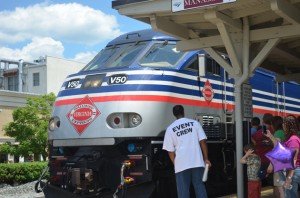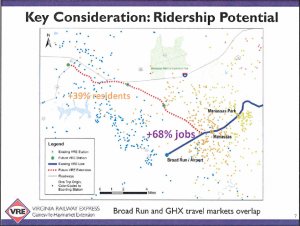 For many children, the ride from Manassas to Clifton was their first time on a train.
For many children, the ride from Manassas to Clifton was their first time on a train.Virginia Rail Express (VRE) hopes to add three new commuter stations in western Prince William County to open in 2022.
Railway Express Chief Executive Doug Allen briefed the Prince William Board of County Supervisors, during their regular meeting, Tuesday, on the findings of the Gainesville Haymarket Extension feasibility study.
Allen showed that the VRE would like to add three new stations between their Manassas station and Route 15 in Haymarket. The VRE route would follow the existing Norfolk Southern Line, contingent upon the railroad company’s ability to continue their operations without disruption.
Along with the Haymarket-Gainesville Extension, the VRE plans upon improving their services along the entire from Manassas line. In addition to commuter hours, VRE wants to add evening and mid day trips, and reverse commute options. They would also add new trains to the route.
Allen told board members that the I-66 corridor, to which the VRE trains would run parallel, is a corridor of statewide significance and VRE is one way to add capacity to that corridor. For that reason, the extension qualifies for both state and federal funding.
“We consider ourselves to be part of the solution,” Allen said.
Allen said the new stations could better serve commuters currently utilizing the VRE in Manassas and Broad Run. It could also attract new riders. This would help control congestion on commuter roads as the area grows in residents and jobs.
Every new rider practically takes a vehicle off a busy commuter road. Since added service solves a significant transportation problem, it qualifies attract federal and state funding.
 Ridership consideration map from the VRE presentation before the Board of County Supervisors, Jan. 19.
Ridership consideration map from the VRE presentation before the Board of County Supervisors, Jan. 19.Although everything is in the initial stage, the study has identified likely funding sources. Federal funding would likely provide 50 percent of construction costs, while state funding would pay anywhere from 25 to 40 percent. Federal fund opportunities include Federal Transit Administration Capital Investment grants and the Transportation Investment Generating Economic Recovery (TIGER) competitive grant program.
State funding may include money from the Rail Enhancement Fund and the Commonwealth Transportation Board, which chooses projects considered a priority to the Commonwealth of Virginia.
Local funds would include money from the regional Northern Virginia Transportation Association and possibly private investmentor if necessary.
“There’s a chance Prince William would be responsible for some, but that’s not our intent,” Allen said.
Of operation costs, rider fees account for 50 percent of operation costs. The second half is derived from state and local funds, meaning Prince William will be required to pay a subsidy towards operation of the new trains and stations. What that subsidy is has not yet been determined.
Utilizing the Norfolk Southern B-line that would significantly control the cost of the expansion.
According to Mary Nohe (R), Coles Supervisor and Chairman of the Northern Virginia Transportation Authority, Norfolk Southern’s B-line now operates on a single track. A second track would be necessary to allow trains to park and pass each other, but that would not be too expensive.
However, if a third track is required, the project could become very expensive since it would warrant the purchase of additional right-of-way. Nohe said the study has not yet determined if a third track is necessary, but if it is, it would have to be done within the initial build out otherwise the cost becomes even higher.
Other costs include the building new a new track, stations, automobile parking lots or garages and train yards. Prince William may need to set aside funds for operations. Supervisors would need to plan ahead before the new stations open.
Who is going to pay for the operating is something we haven’t really discussed yet,” Nohe, told Bristow Beat.
Nohe told his board they have to a clear message that they intend on providing the funds, or else risk losing state and federal funding sources. And, Nohe also said they will need to set a placeholder for these funds within their five-year plan during this year’s fiscal year 17 budget cycle.
He said it is unfortunate that it is a difficult time to fund the VRE because their existing bus service is struggling. However, because the I-66 improvements will be the last likely for another generation, additional transportation becomes extremely important for Prince William and the Northern Virginia region.
Existing VRE is nearing its capacity, but Nohe also believes that building more station will attract new riders.
“We’re at record ridership levels, but we’re not leaving people on the platform. We know more demand is out there. There are absolutely people in the Haymarket area that the only reason they don’t ride the train right now is they have to drive 20 minutes to the station.”
Those with homes near new stations can “absolutely” expect an increase in their property values said Nohe. “This is going to be huge for our region.”
Supervisors were excited about the prospect of expanding VRE.
“We’re all excited… had been discussed by Wally Covington for years. I know the board feels very strongly about PRTC and VRE… I think our constituents will agree we need to get people off the road,” said Potomac Supervisor Maureen Caddigan (R).
Brentsville Supervisor Jeanine Lawson (R), whose district the line would traverse sounded pleased.
“This is the project that excites me the most,” Lawson said, adding that commuters in her district are “very tuned in to what the VRE’s future is.”
Support Bristow Beat - Donate Today!